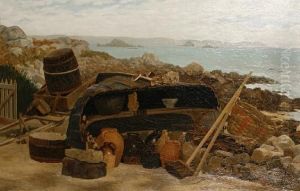Samuel George Pollard Paintings
Samuel Pollard was born on April 20, 1864, in Camelford, Cornwall, England, to a family of Bible Christians. He was not primarily known as an artist in the traditional sense, but rather as a Christian missionary and the creator of the Pollard script for the A-Hmao language, which was widely used among the Miao people (also known as Hmong) of China.
Pollard's family was deeply religious, and his upbringing in a devout environment profoundly shaped his future. In 1886, at the age of 22, he was sent as a missionary to China by the Bible Christian Church. Upon arriving in China, he initially worked in the region of Shandong before moving to Yunnan Province, which was home to various ethnic minority groups, including the Miao people. Pollard was dedicated to his missionary work, and he was particularly interested in the language and culture of the Miao people. He recognized that the lack of a written script was a significant barrier to their development and the spread of Christianity.
Pollard set out to create a writing system for the A-Hmao dialect, which would become known as the Pollard script or the Miao script. He used his creativity and understanding of the language to develop this script, which was an innovative form of syllabary, distinct from the Chinese characters that were used by the dominant Han culture. The script was introduced in 1905 and was enthusiastically received by the Miao people, as it provided them with a means to write their own language for the first time.
In addition to his linguistic contributions, Pollard was also instrumental in establishing schools, promoting literacy, and translating religious texts. He worked closely with the Miao communities, and his efforts led to a significant number of conversions to Christianity. His humanitarian work extended to improving the welfare of the local people, advocating for their rights, and helping to develop agriculture and combat opium addiction.
Tragically, Samuel Pollard's life was cut short when he died of typhus on September 16, 1915, at the age of 51. Despite his relatively short life, Pollard left a lasting legacy in China. His script continued to be used and adapted for various Miao dialects and has been recognized for its role in preserving Miao cultural identity. Pollard's dedication to his work and his impact on the Miao people are remembered and celebrated, particularly among the Hmong communities around the world.


